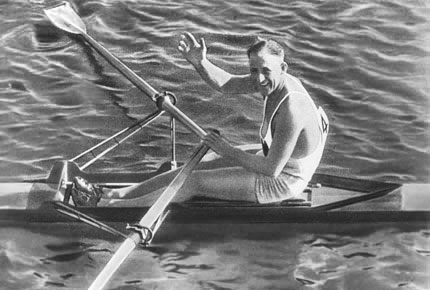
Los Angeles, Long Beach, August 1932: Henri Robert PEARCE of Australia, winner of the rowing single sculls event during the Games of the X Olympiad. Credit: IOC Olympic Museum CollectionsOther names: PEARCE, Robert Henry
Born: 30 September 1905
Deceased: 20 May 1976
Birthplace: N/A
Nationality: Australia
Sport: Rowing
ATTENDANCE AT THE OLYMPIC GAMES
Amsterdam 1928
Los Angeles 1932
AWARDS
Olympic medals:
Gold: 2
Other results:
British Empire Games
Gold: 1 (30)
A friend of ducks
At the 1928 Amsterdam Olympics, Bobby Pearce, a third-generation sculling champion from the Sydney suburb of Double Bay, faced an unexpected challenge in the middle of his quarterfinal race against Victor Saurin of France: a family of ducks passed single-file in front of his boat. Pearce let them pass and then sculled to victory, much to the delight of the Dutch onlookers.
In the final, Pearce defeated Kenneth Myers of the United States by the unusually large margin of 9.8 seconds. Pearce had hoped that his Olympic win would allow him to row in the Diamond Sculls at Henley, but he was refused admission because he was a carpenter. Back in Sydney he was unable to find work due to the Depression. When Lord Dewar, the Canadian whisky manufacturer, learned of Pearce's plight, he offered him a job as a salesman.
This new position made Pearce eligible for Henley, since he was no longer a laborer. In 1931 he went to London and won the Diamond Sculls by six lengths. Although he moved to Hamilton, Ontario, in Canada, Pearce represented Australia again in 1932.
In the final, held in Long Beach, California, Pearce faced another American, William Miller. This time it was a closer race, but Pearce fought back Miller's challenges and became the first rower to win the singles sculls gold medal twice.